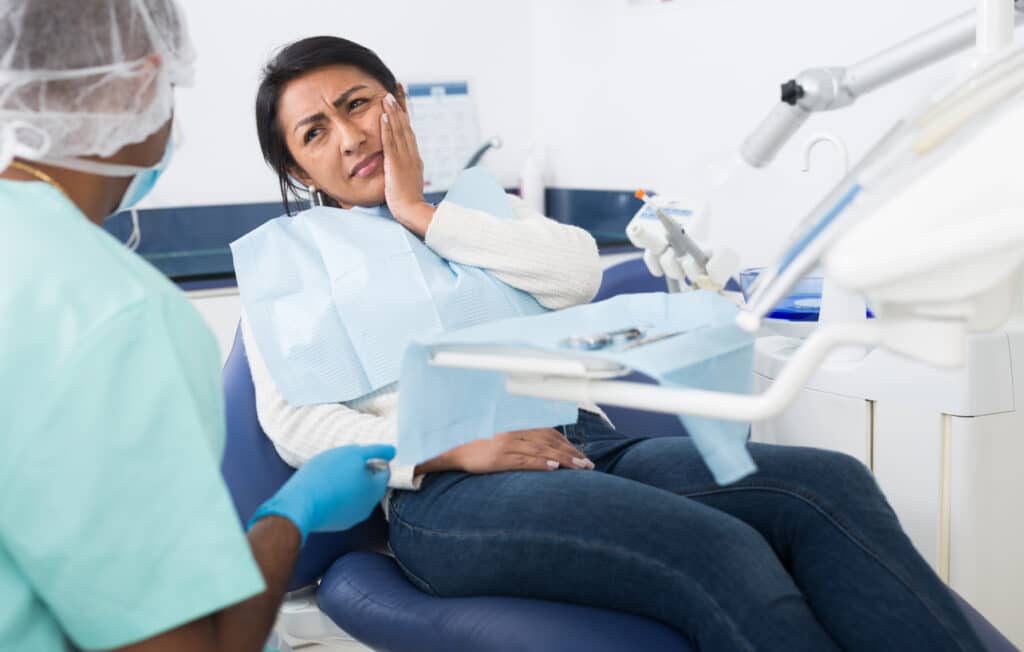Although it is not usual, you could wake up one day and find out while looking at the mirror that one of your teeth has taken a darker tone.
There are many reasons why teeth could change color and various aspects to consider before starting to worry. Furthermore, the cause of the discoloration is often not that serious. However, our emergency dentists at our office in Miami can help you find out what’s happening to your teeth and solve it as soon as possible.
Our dentists take 24-hour turns during the weekends to ensure your comfort and solve any problem that could be affecting you at night.
In this article, we’ll talk about what could be changing the color of your teeth.
Multiple teeth affected
The first to check is if the change of color is in multiple teeth or an isolated case.
Color change in multiple teeth at the same time is usually associated with pigmentations. Having a diet that includes frequent consumption of pigmenting food or beverages, such as coffee, tea, and wine, can change the color of your teeth.
Upon constant contact with the pigment, it will penetrate the enamel and dentin and change the color of the teeth, making them look gray or yellow.
Nicotine
Cigarettes and products containing nicotine can change the color of the teeth. Usually, a dental cleaning is good enough to eliminate the yellow stains formed by a mix of nicotine with saliva and biofilm over the teeth.
However, nicotine pigments are also capable of penetrating teeth layers, becoming intrinsic pigmentations. Fortunately, these changes of color can be easily fixed with dental whitening.
Single tooth discoloration
If there’s only one tooth affected, it often means the cause is different.
Usually, a single dark tooth is an indication of pulp necrosis. The dental pulp is a tissue made of micro blood vessels and nerves. It resides inside the tooth and is responsible for giving vitality.
The dental pulp is susceptible to multiple stimuli. An outer stimulus, such as a cavity, can trigger an inflammatory reaction. This inflammation is reversible in its initial stage. However, it turns irreversible if left unattended and advance to pulp necrosis.
Moreover, a strong trauma on the tooth can burst the blood vessels of the pulp and cause instant necrosis.
The darker tone acquired by the tooth is due to the penetration of the blood pigments to the dentin surrounding the pulp chamber. Therefore, it causes an intrinsic pigmentation from the inside out.
Also, pulp necrosis is usually painful. You might experience some severe pain before the tooth color change. However, it can be asymptomatic in some cases, and the only indication is the dark color.
What can I do?
Whether you receive trauma or have a cavity, it is highly advised to visit your closest emergency dentist if one of your teeth has turned black.
Pulp necrosis can quickly lead to infections and dental abscesses. Our dental office is open 24 hours throughout the weekends, with emergency dentists ready to help you as soon as you arrive. We offer top-quality service, so you can achieve the oral health you deserve.
REFERENCES:
Green, J. (2021, June 24). The hard truth about Black Teeth. Retrieved July 21, 2021, from https://www.starimagedentistry.com/blog/the-hard-truth-about-black-teeth/
Johnson, J. (2018, May 18). Black teeth: Stains, other causes, and treatment. Retrieved July 21, 2021, from https://www.medicalnewstoday.com/articles/321777
Jones, K. (2021, July 07). Black teeth, the causes and treatments. Retrieved July 21, 2021, from https://www.thedentalcentrelondon.com/black-teeth-symptoms-causes-and-treatment/
Nall, R. (2018, September 18). Why Do Teeth Turn Black? Retrieved from https://www.healthline.com/health/black-teeth

